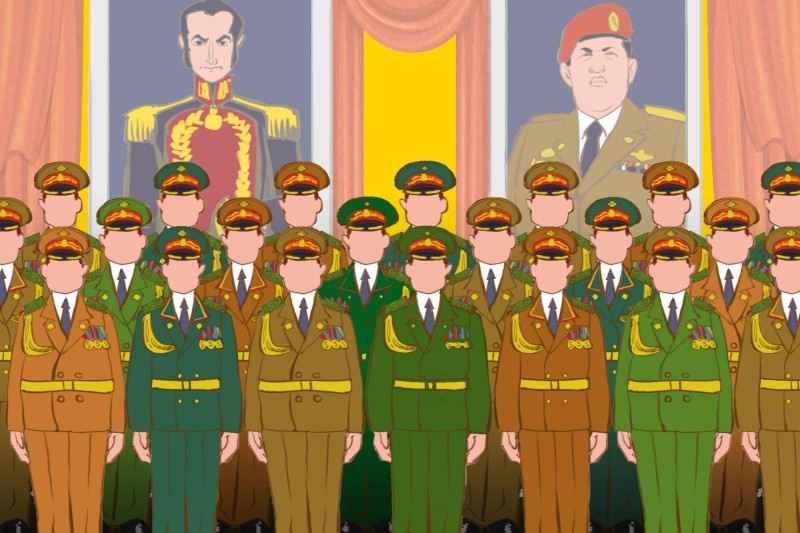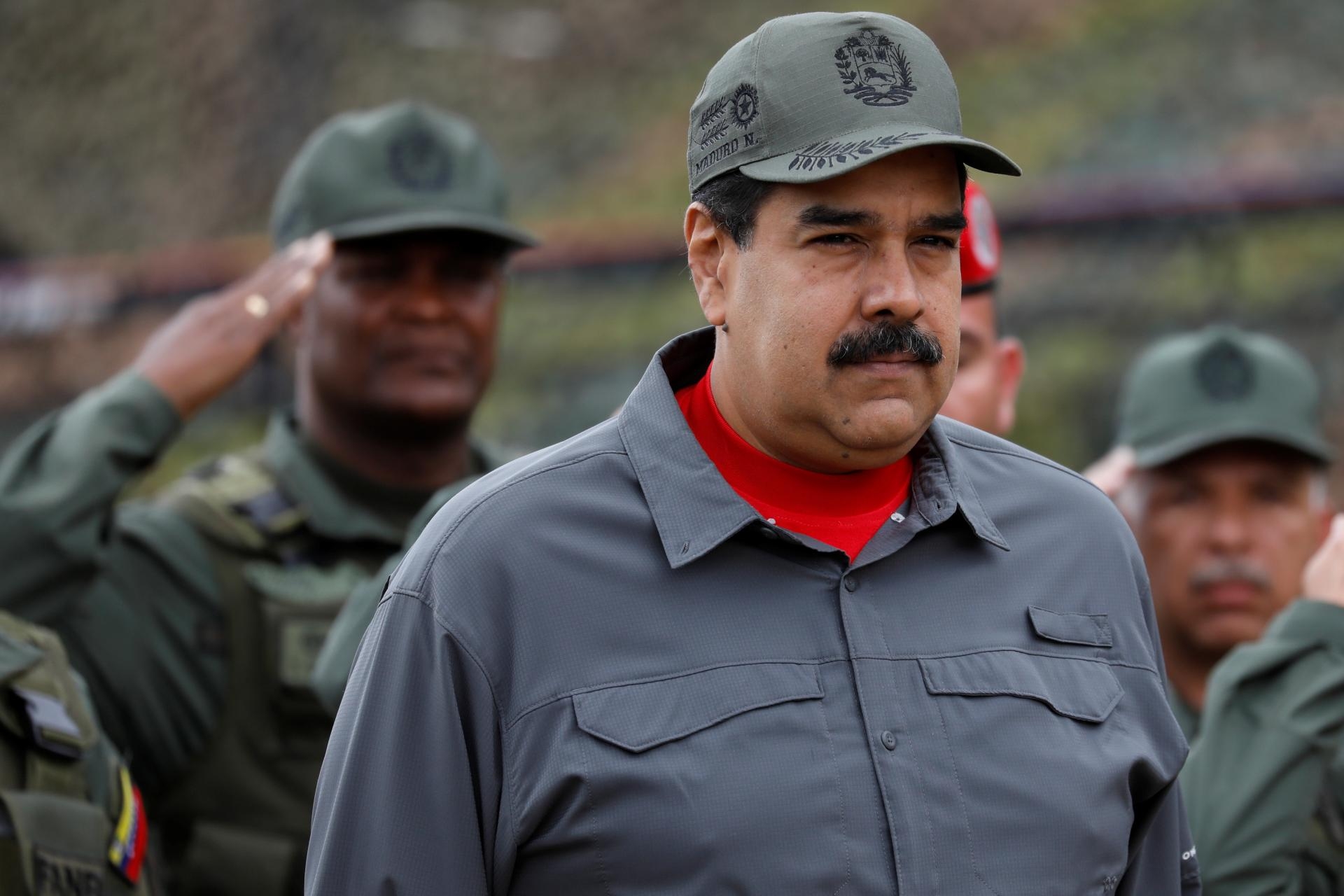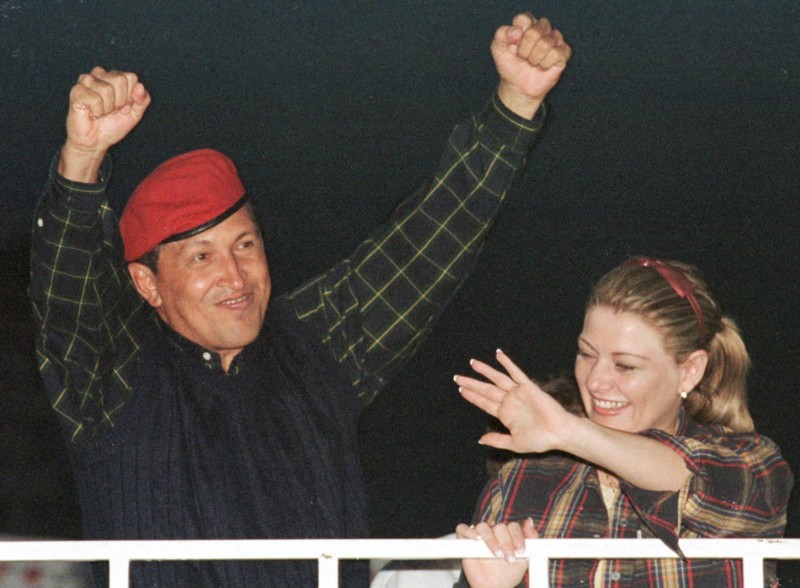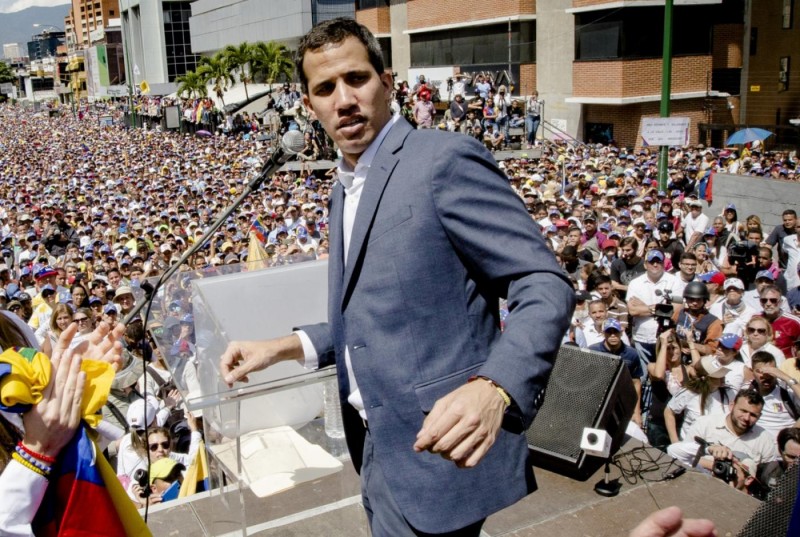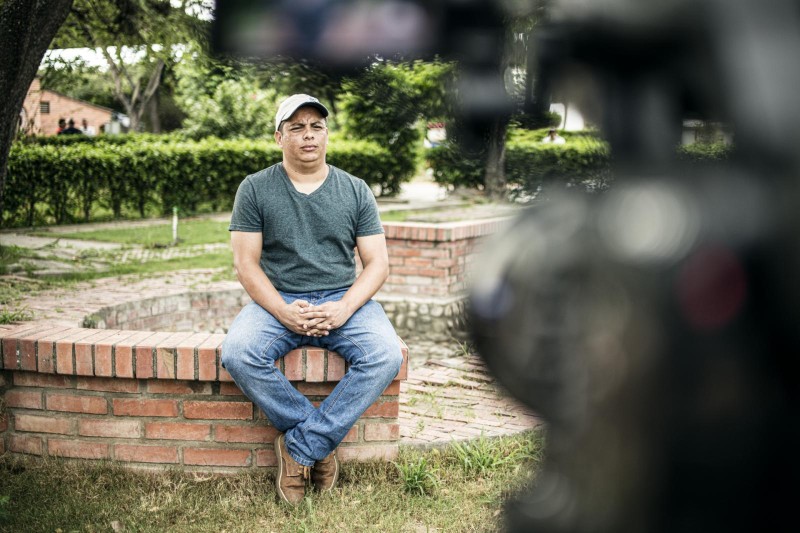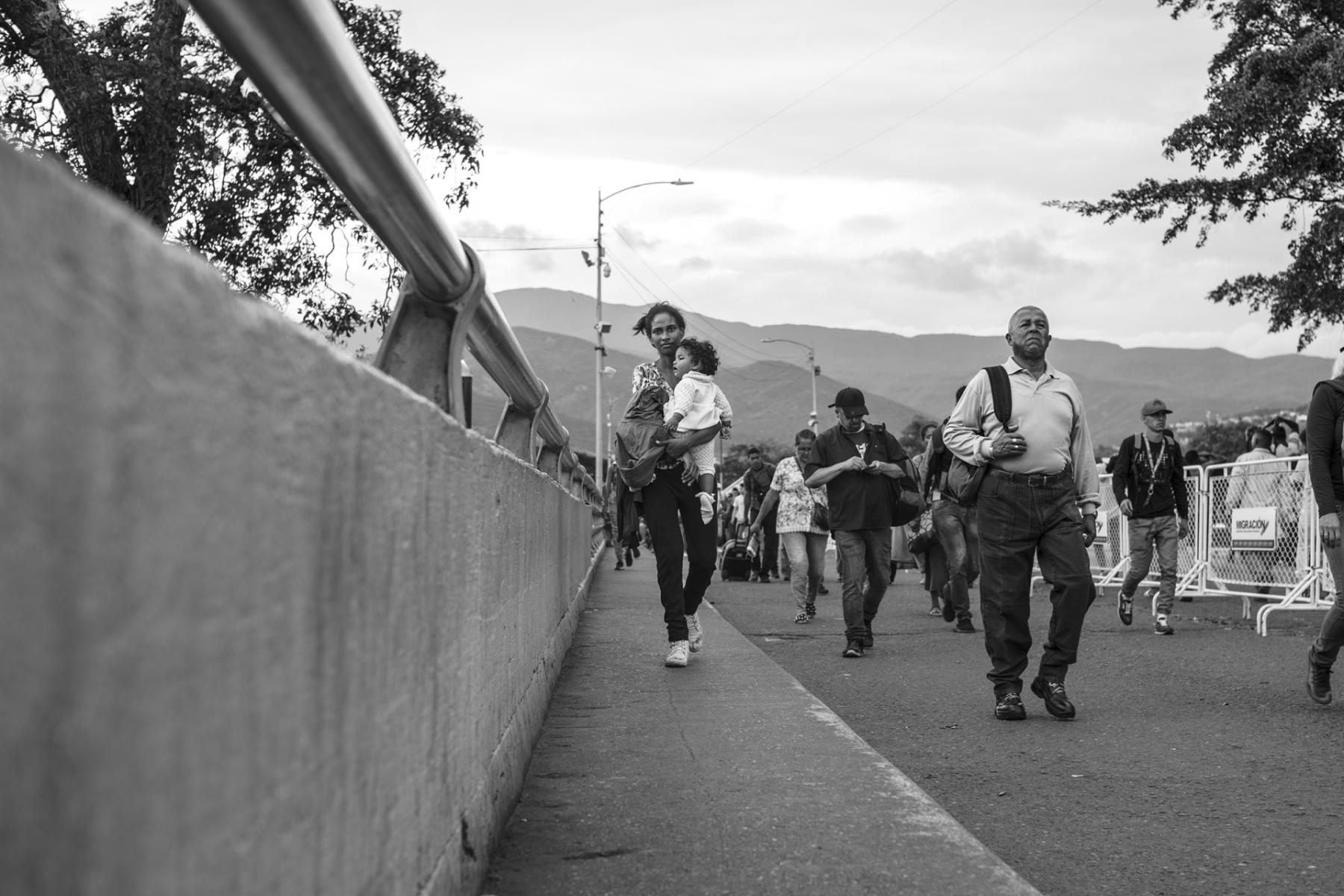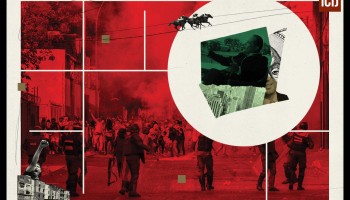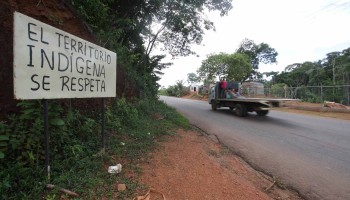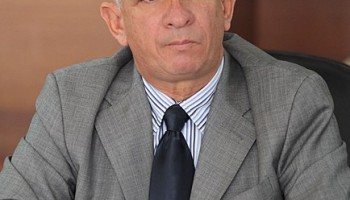Extreme shortages of food and medicine, hyperinflation, violent political repression, and outrageous corruption — many governments might have buckled under the weight of such a compounded crisis.
Not in Venezuela, where top military officers have been richly rewarded for maintaining the status quo, even as the country has spiralled into economic ruin.
An OCCRP investigation has exposed the intimate financial relationships between the administration of President Nicolás Maduro and a coterie of generals with ties to private companies. Analysts say the embattled regime used financial rewards such as lucrative state contracts to ensure their loyalty as the political and economic situation deteriorated.
The investigation was sparked by a cache of internal army documents provided to OCCRP. Reporters then scoured land and company records in Venezuela and the U.S., and interviewed sources such as military officers with knowledge of companies connected to the generals. Reporters also gained access to a copy of the registry for companies receiving state contracts in Venezuela from 2017, before the government took most of the information offline.
The documents reveal for the first time that, as of 2019, Venezuela had 312 active generals in its army, the most powerful branch of the Armed Forces. Some 84 of those generals work with private or public companies that are listed in the National Contractor Registry, which allows them to do business with the government. Of those 84 generals, 35 sit on the boards of private companies.
Reporters focused their investigation on the last group. These 35 generals have started dozens of private companies in Venezuela since 2003. They are major players in key economic sectors like construction, food, transportation, and oil, winning 225 contracts with state companies over the years. They have delved into industries as diverse as advertising, healthcare equipment, toys, and tourism.
Under the Venezuelan Constitution and the country’s anti-corruption law, it is illegal for public officials to use their office for personal benefit, either directly or through a third party. That includes capitalizing on personal connections to win state contracts.
Research by Venezuelan NGO Control Ciudadano found that members of the military have also become involved in 15 areas of illegal activity, including drugs, arms trafficking, kidnapping, and extortion.
On March 26, Washington indicted Maduro and other top officials — including the defense minister, General Vladimir Padrino — for allegedly conspiring to smuggle cocaine into the U.S. The Department of Justice accused Maduro and three military men of running a smuggling ring known as the “Cartel of the Suns.”
The name “refers to the sun insignias affixed to the uniforms of high-ranking Venezuelan military officials,” the Justice Department said in a statement.
All the other alleged cartel leaders also have ties to the military. They include Diosdado Cabello Rondón, a politician and active captain; retired General Hugo Armando Carvajal Barrios, a former director of military intelligence also known as “El Pollo”; and retired General Clíver Antonio Alcalá Cordones.
Lawsuits in several countries show some senior officers also used a former government scheme, which allowed select companies access to cheap U.S. dollars, to embezzle billions. (OCCRP has uncovered no evidence that members of the “35 Club” were involved in any such crimes.)
"It becomes like a military doctrine for some officers to create a company,” said Pedro Mendoza, formerly a lieutenant in Venezuela’s National Guard, a branch of the armed forces, who deserted in 2019 and crossed the border to neighboring Colombia.
He described the Maduro administration’s attitude towards its generals as, “You protect me, you keep me in power, and I give you the possibility of economic benefits.”
‘The Essence of Madurismo’
Military incursion into Venezuela’s economy began two decades ago with the rise to power of Hugo Chávez, a former lieutenant colonel in the army who was elected president in 1998.
Until that point, the armed forces had remained largely separate from most aspects of government and public policy for decades after a military government ended in 1958. Soldiers were even barred from voting.
Chávez instituted a new “civil-military” alliance and launched the $114-million Plan Bolívar, which saw tens of thousands of soldiers take part in public projects like rebuilding roads and fixing schools. Under Venezuela’s new constitution, which came into effect at the end of 1999, the military was tasked with driving national development, and the president took control from Congress over promoting senior officers.
After a failed military coup in 2002, Chávez increased the role of trusted officers in running the economy. High-ranking military officials gradually took control of five ports, along with the state oil company — a key foreign-currency earner for the country — Petróleos de Venezuela S.A. (PDVSA).
Three years later, Chávez expanded the military’s role in society even further with a new law aiming at “the strengthening of civic-military integration.” The government and military portrayed themselves as united in defense of the nation, and civilians were recruited into a new hybrid military corps.
Senior members of the armed forces also swiftly gained traction in the world of business. In 2005, records show military officers registered seven companies, more than any year before or since.
When President Maduro took over in 2013, after Chávez died, he expanded the military’s role in civilian life even further. As of 2018, active or retired officers comprise seven out of 23 state governors, along with nine heads of government ministries. Officers also ran at least 60 state companies.
Such officers constitute the “essence of Madurismo,” according to Javier Corrales, a professor and chair of political science and Latin America expert at Amherst College, in the U.S. state of Massachusetts.
“That is more important today than at any time under Chávez, even though Chávez was in the 2000s the inventor of the civil-military alliance,” he said in an email.
Madurismo won the day in 2019, when opposition leader Juan Guaidó unsuccessfully tried to rally troops to support his bid to lead the country.
Along with several foreign governments, Venezuela’s National Assembly declared the previous year’s elections — won by Maduro — to be illegitimate, and instead recognized Guaidó as interim president. Some soldiers also supported the move, but it failed to take hold among the military’s most powerful officers.
Due to severe restrictions on reporting inside Venezuela, it is hard to determine whether any members of the 35 Club engaged in corrupt practices. However, dissident officers who fled the country have provided witness accounts of how companies run by Venezuelan generals have exploited state-run projects.
High Life, Low Salary
Before Harry Solano crossed the border into Colombia, he was a sergeant in Venezuela’s National Guard. But the endemic corruption he saw first-hand working with military-led companies on government projects appalled him so much he helped organize a short-lived popular uprising in January 2019.
At one state-owned steel factory, he said he was ordered to load steel rebar onto trucks owned by a general. “They would take them out of the factory and keep them for their personal companies, and then resell them,” Solano told OCCRP from Cucuta, a border city in Colombia, where he fled after the uprising failed.
He saw a similar scheme as an inspector at a Housing Mission, a government project to build homes for the poor, where he said he watched building materials imported from China being looted. “The steel rebars, the doors, the cement, they stole it in order to sell it to private companies,” he said, referring to people working for a senior military officer.
“I tell you, out of 100 tons of rebars that arrived, only one ton went to the Housing Mission in Anzoátegui State. But the 99 tons that were missing were lost."
Solano said these kinds of corruption schemes explain why high-ranking military officers still support the government. “If the regime falls, the officers stop receiving money,” he said. “There is nothing ideological. Everything is business.”
Another former lieutenant who fled to Colombia, and who asked not to be named as he fears reprisals against his relatives who still live in Venezuela, said he had seen some generals who ran housing construction projects go on to create companies that obtained contracts to work on public programs.
“Loyalty to the Maduro regime is to make a profit,” he said. “That's loyalty, that's why they don't betray.”
Further investigation also shows that the lifestyles of some generals are wildly incompatible with their wages. Payment records obtained by OCCRP show that a lieutenant earns, on average, $6.30 a month, while a general gets just $8.90.
Military wages were eviscerated along with the rest of Venezuela’s economy, which the International Monetary Fund said has experienced the worst collapse in half a century of any country not at war or crippled by natural disaster. Hyperinflation has continued unabated, with prices doubling monthly. The inflation has wiped out most of the savings of average Venezuelans. The proportion of the population living in extreme poverty leaped from 10 percent in 2014 to 85 percent in 2018.
Research by the Center for Economic and Policy Research, an influential Washington DC-based think tank, found U.S. sanctions have worsened the crisis, exacerbating food shortages, driving displacement and making it harder to stabilize the economy.
The low salaries due to the economic meltdown created an added incentive for officers to generate alternate revenue streams, according to Mendoza, the ex-national guardsman now in Colombia, whose austere haircut and straight posture still hint at his former life.
"The salaries are not enough,” he said in an interview in a small chicken restaurant in Villa del Rosario, a 10-minute drive from the bridge over the Táchira River into Venezuela. “That’s why the officers have all their business in parallel.”
OCCRP has linked family members of the country’s defense minister, General Vladimir Padrino, to a constellation of companies and properties in Venezuela and the U.S. worth millions of dollars, although officially he earns under $8 a month.
General Hernan Akhnanton Noguera Mejía has won the most state contracts of anyone in the 35 Club, with 47 in total. His Asociación Cooperativa Andina de Festejos, which he set up one month after being promoted to Lieutenant Colonel, provides services organizing and catering events. They have included several official bashes, such as a barbeque for more than 600 customs and tax officials, and a ceremony to receive new patrol cars and police motorbikes, held beneath tents decorated with dozens of palm trees.
Although Noguera also only earns around $9 a month, according to records leaked to OCCRP, he has posted on his Facebook profile about frequent foreign holidays to Italy, Spain, Israel, Malta and Monaco. In 2010, he even took a Mediterranean cruise.
“There has been no willingness to review what is happening with those officers who are linked to a political sector and who handle huge amounts of money,” said human rights lawyer Alonso Medina Roa, who has defended several officers accused of rebelling against the Maduro regime.
“The public official has to offer exclusive dedication. He cannot contract with the state. You cannot generate another type of commercial activity.”
‘No Access’
In some cases, reporters found evidence that generals had even set up companies in the same industry as their official duties.
They include General Jesús Rafael Villamizar Gómez, who in 2016 was appointed commander of the president’s personal guard. In 2011, the same year he got his first position attached to the president’s office, Villamizar also became the secretary and shareholder of security company Asociación Cooperativa Seguridad y Protección Universal 1204. (He did not respond to a request for comment.)
But when reporters visited the headquarters listed for the company in the state contractors registry, they found only a residential address. A security guard said that no company operates, or has ever operated, on the premises.
Sometimes officers have even used their relatives to keep their business dealings secret. OCCRP found that family members of at least five generals hold key positions in their companies. In some cases the wives of senior officers also have private companies of their own that are registered as contractors.
General Alejandro Ramón Maya Silva, director of the army general commander's office, is linked to two companies: Aquila Grupo Empresarial, C.A. and La Granja Integral, C.A. The last one is an agricultural company, founded in 2017, when he was already a general, which lists a daughter and a son as board members. (General Maya did not respond to a request for comment.)
Information about companies linked to the Venezuelan generals in this story was gleaned from the National Contractors Registry. Until three years ago, it was publicly available and included information such as company addresses, the identities of shareholders and board members, and details of public contracts. Then in 2017, the government severely limited the information on the registry, deleting the names of people involved in companies. In a day, Venezuela became almost as opaque as an offshore jurisdiction.
OCCRP obtained a copy of the complete database, as it looked just before it was withdrawn. The government said it took the measure because registry information was being used by organized crime groups for extortion and kidnapping.
But Andrés Cañizalez, a researcher at Venezuela’s Universidad Católica Andrés Bello, said the decision was intended to “prevent further investigations in a number of cases where the family links of state contractors to senior officials had been uncovered.”
“State contracting is really a black box in Venezuela,” he added. “There’s no access.”
